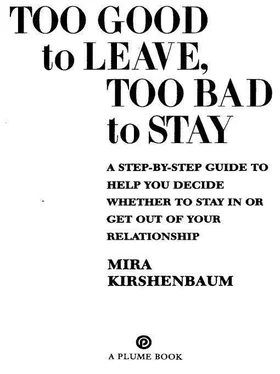Kirshenbaum, Mira - Too Good to Leave, Too Bad to Stay
Здесь есть возможность читать онлайн «Kirshenbaum, Mira - Too Good to Leave, Too Bad to Stay» весь текст электронной книги совершенно бесплатно (целиком полную версию без сокращений). В некоторых случаях можно слушать аудио, скачать через торрент в формате fb2 и присутствует краткое содержание. Жанр: Психология. Описание произведения, (предисловие) а так же отзывы посетителей доступны на портале библиотеки ЛибКат.
- Название:Too Good to Leave, Too Bad to Stay
- Автор:
- Жанр:
- Год:неизвестен
- ISBN:нет данных
- Рейтинг книги:3 / 5. Голосов: 1
-
Избранное:Добавить в избранное
- Отзывы:
-
Ваша оценка:
- 60
- 1
- 2
- 3
- 4
- 5
Too Good to Leave, Too Bad to Stay: краткое содержание, описание и аннотация
Предлагаем к чтению аннотацию, описание, краткое содержание или предисловие (зависит от того, что написал сам автор книги «Too Good to Leave, Too Bad to Stay»). Если вы не нашли необходимую информацию о книге — напишите в комментариях, мы постараемся отыскать её.
Too Good to Leave, Too Bad to Stay — читать онлайн бесплатно полную книгу (весь текст) целиком
Ниже представлен текст книги, разбитый по страницам. Система сохранения места последней прочитанной страницы, позволяет с удобством читать онлайн бесплатно книгу «Too Good to Leave, Too Bad to Stay», без необходимости каждый раз заново искать на чём Вы остановились. Поставьте закладку, и сможете в любой момент перейти на страницу, на которой закончили чтение.
Интервал:
Закладка:
But if your vision of a relationship is two people spending weekends cycling out to the country together and mine isn’t, then we disagree about our lifestyle. And if we not only disagree but do so passionately, and if this vision of a relationship is of the essence of what you want to get out of life, and mine is for me, too, then this disagreement gets at the heart of how we each want to live and attacks the heart of our relationship.
I’m not talking about details or fragments of a lifestyle. I’m talking about what I call the armature of a lifestyle, the inner framework that gives a life shape and substance. It’s about what you care about in how you actually live.
The difference could be about something as basic as having children. It’s not an issue of one person wanting children more than the other—that difference is very often the case. But when one person in a relationship sees having children as a central feature of her vision of what her life will be like and the other person, for whatever reason, has counted on and is committed to a life free of the obligations children entail, then this is a difference about the essence of what you care about most in how you actually live.
TV or Not TV, That Is the Question
To show you how lifestyle is the one place where a difference makes a difference, just perform this little experiment in your mind: Imagine what would happen if, in every one of the 70 million marriages in America today, one of the partners suddenly insisted that all TVs in the house must go, that their marriage must be a totally TV-free marriage for both people. Assume they really meant it and would stick by it no matter what.
How many marriages do you think would be left a year later? How many people would stay together if they realized that a lifetime with their partner meant a lifetime without television?
I think most of us, no matter how much we believe in love, would guess that out of 70 million relationships a lot of people would choose to leave rather than actually spend every day of the rest of their lives without the possibility of watching their favorite shows or vegging out in front of the tube.
Now let’s look at this idea of lifestyle differences as we actually experience them. Here’s an example. I’ve rarely seen couples, either those seeking help or those who didn’t feel they needed help, either heterosexual or homosexual, where there weren’t all kinds of differences between the partners about what they liked in lovemaking. But even huge differences here were not necessarily relationship-undermining lifestyle issues in themselves.
On the other hand, there have been some couples where for one or both people something about sex was a lifestyle issue. Then their difference made all the difference. For one woman, making love for hours was the centerpiece of what she looked forward to every day she didn’t have to go to the office. This wasn’t the all-too-common issue of a woman complaining that her partner didn’t like to spend enough time in foreplay It was an issue for her of who she was as a person and virtually the meaning of her life. But her partner felt bored, trapped, humiliated, and deprived by this lovemaking that went on for hours and hours and used up every bit of spare time.
The Quality of Our Lives
The quality of our free time is the centerpiece of the quality of our lives for most people. The difference between these two people wasn’t about one little thing in their free time but about the entire nature and structure of their free time.
You can see why, in the country mouse/city mouse factor I mentioned earlier, the couples I referred to had an unbridgeable difference. When one of you passionately wants an urban lifestyle and the other passionately wants a rural lifestyle, then the thing you want affects every part of your life.
It’s clear why the lifestyle difference is so critical. It’s the reason people end up choosing a lifestyle over their partner: it’s what you want from a relationship in the first place. Think back to the relationship choices you’ve made. It’s never just a person you wanted to be with. You wanted that person combined with the lifestyle you’d have (or you thought you’d have) with that person.
I’m not saying every possible aspect of lifestyle is what you wanted. It may be that whether you had money or not wasn’t important to you. Or whether you lived in the city or the country wasn’t important to you. But your vision of happiness with that person included a vision of how you’d live with that person, what your life with that person would be like.
So when two lovers look into each other’s eyes, they’re saying, “You are my lifestyle.” Well, they don’t actually say this, but in ef fect that’s what they’re choosing when they stay, and it’s also what they’re rejecting when they leave. When the overall, basic quality of your life is at stake, you need to feel you can give yourself permission to choose the life that feels good to you over the life that doesn’t.
Robert’s Story
What happened to Robert and Agnes is sadly all too common. They’d had a relatively successful marriage for many years. It was a traditional marriage, in which Robert had worked hard to become a rich and prominent attorney, while Agnes stayed home to bring up three children and do the endless entertaining and civic duties that were so important for his career. They both felt it was a worthwhile partnership. It was the lifestyle they’d both married.
But things don’t stay the same, whether you’ve been together many years or just a couple of years. When their oldest child went off to college, Robert and Agnes started moving rapidly in opposite, incompatible directions. Robert had grown weary of the legal grind. He found work boring, depressing, and empty, and he’d talked about retiring early and moving to a modest villa in the countryside of Northern Italy. Besides, he had his “go to hell” money: the dough he needed to walk away from work and never come back. He wanted to spend the rest of his days enjoying himself.
Agnes was the opposite. All those years she’d spent taking care of home and family had turned her into a coiled spring of ambition, more and more compressed, ready to explode when the pressure was taken off. With the children starting to leave home, she wanted a life of her own, a career out in the world, accomplishment, success.
Devastating differences over lifestyle were starting to take hold of Robert and Agnes. Before, whatever their differences, their visions of their lifestyle were complementary. Now their differences were about their lifestyle and were incompatible.
Robert didn’t want to retire to an empty house; he wanted Agnes to share a hobby-filled, trip-taking retirement with him based on a completely new life in someplace like Northern Italy. But Agnes wanted freedom. She’d felt tied down by Robert and his life and now she wanted a life of her own. But it would be hard enough for a woman in her early fifties to build a career; she’d have to stay where she was with all of her friends and connections to have any chance.
Two people who’d lived in harmony for years ended up in bitter opposition. They still liked each other well enough and still had similar tastes and values. But now Robert was horribly torn. There was the life he wanted: somewhere far away where all thought of responsibility was gone and with a companion by his side. There was the life Agnes was willing to offer: staying put, facing an empty house every day. For Robert the lifestyle Agnes offered didn’t feel like the retirement he’d dreamt of; it felt like premature death.
I’ll tell you what happened to Robert and Agnes in a moment. But first here’s the guideline:
Читать дальшеИнтервал:
Закладка:
Похожие книги на «Too Good to Leave, Too Bad to Stay»
Представляем Вашему вниманию похожие книги на «Too Good to Leave, Too Bad to Stay» списком для выбора. Мы отобрали схожую по названию и смыслу литературу в надежде предоставить читателям больше вариантов отыскать новые, интересные, ещё непрочитанные произведения.
Обсуждение, отзывы о книге «Too Good to Leave, Too Bad to Stay» и просто собственные мнения читателей. Оставьте ваши комментарии, напишите, что Вы думаете о произведении, его смысле или главных героях. Укажите что конкретно понравилось, а что нет, и почему Вы так считаете.












